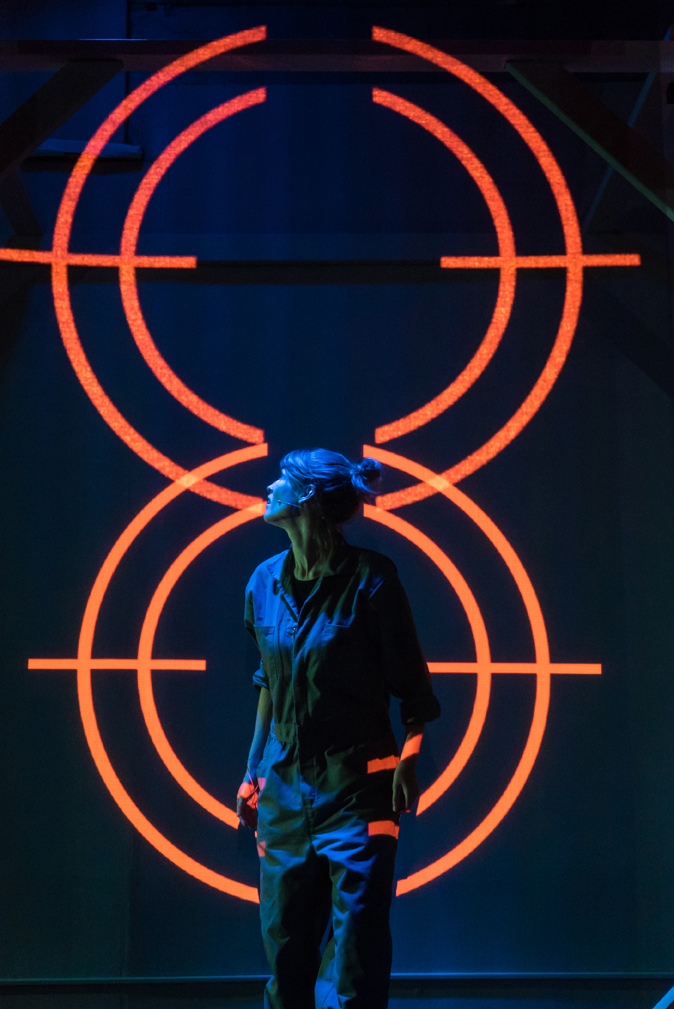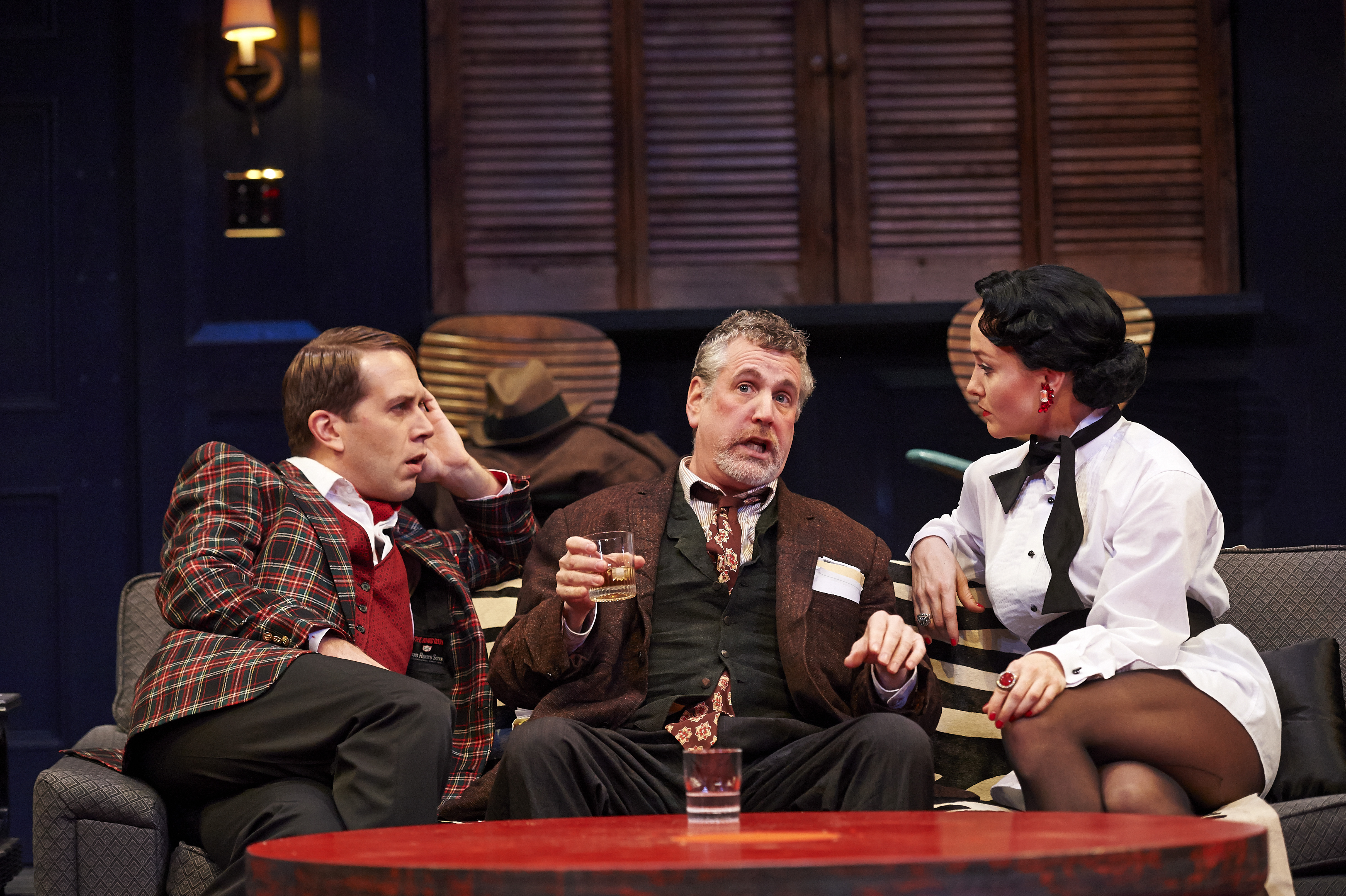Gender parity on and behind Cleveland stages
By Bob Abelman
The #MeToo movement in America – and the international sister movements it inspired – brought about a cultural awakening regarding gender inequality and sexual harassment in the workplace.
More specifically, the movement called attention to the domination of men in power positions within the entertainment industry. In the world of theater, most plays have been written by men, chosen by male artistic directors and cast by male directors.
Not long ago, the League of Professional Theatre reported that female playwrights accounted for only 22 percent of productions in professional theaters across the country. Regionally, 26 percent of works produced in Washington, D.C. were by women, 20 percent of productions in Los Angeles were authored or co-authored by a woman, and 19 percent of productions in Chicago were written by women.
The Stage Directors and Choreographers Society, the union for professional directors, reported that in 2017 women made up just 34 percent of professional directors nationwide and earned significantly less than their male counterparts.
In light of the #MeToo movement, however, there “absolutely is an opportunity to build a more inclusive and diverse leadership composition of the American theatre field,” says Teresa Eyring, executive director of Theatre Communications Group, a nonprofit service organization, in American Theatre magazine. “And there is absolutely a responsibility to recruit with a special eye toward identifying talent among women.”
Locally, in 2018, the Cleveland Play House created an Artistic Directing Fellowship for experienced female directors with regional theater leadership aspirations, designed to offer mentoring opportunities and address inequities in the field. It is also the theater’s programing policy that half of its season’s protagonists, playwrights and directors will be female. At Dobama Theatre, the entire 2018-19 season will feature plays written by female playwrights, whose work will be getting their regional, Midwest or Cleveland premiere.
Is this indicative of a larger paradigm shift regarding gender parity in Northeast Ohio or mere window dressing?
Five of Cleveland’s most talented and accomplished female actors – Anjanette Hall, Rachel Lee Kolis, Lisa Langford, Anne McEvoy and Derdriu Ring – gathered with Canvas at Dobama in Cleveland Heights to discuss and evaluate the current state of the art on and behind local professional stages.

Derdriu Ring as Dr. Lorna James in Dobama Theatre’s “The Effect.” Photo by Steve Wagner Photography.
Canvas: Why is it important for women to serve in creative leadership roles, as playwrights and directors on stage and as artistic directors behind it?
Anne McEvoy: Considering that half the population is female, it only makes sense that we have a female perspective on stories. And not just the stories that are about women, but that are about life in general.
Derdriu Ring: I’d say it feels very safe to have a female artistic director. To me, in a safe working environment, you’re not dealing with any of those sexual harassment issues that certainly young actors have to deal with.
Lisa Langford: Representation matters. So, if you don’t have a woman or an African-American or an LGBTQIA (lesbian, gay, bisexual, transgender, queer/questioning, intersex and asexual/allied) in a position of leadership, you assume that it’s normal. The more we realize everybody’s story has some aspect of universality, the better shot we have at understanding each other and having less craziness in the world.
Canvas: Are things changing on this front? Are they changing fast enough?
Ring: The thing that makes me very angry is that we’re still having this conversation. You know the bumper sticker “Evolve”? Have we not yet evolved? I had this very conversation with (Irish playwright) Marina Carr one time. She really hates being called a female playwright. “They keep saying I’m the best Irish female playwright. Why can’t I just be the best playwright?”
Anjanette Hall: I think we’ve been talking about evolving since I can remember. When I was an undergrad, in graduate school and all throughout my professional career, we always talk about the need for women playwrights, directors and artistic directors. We’ve always talked about the evolution of it. Maybe it was complacency or maybe no one was really listening, but it feels like right now is the time we’re saying enough is enough.
Rachel Lee Kolis: I think it’s a really interesting time, because as a woman, with women being put in the spotlight, you want to feel empowered. But I personally struggle with this weird anger. It’s so active – we have to look at statistics and remind ourselves that women are under-represented, and we have to actively try to represent them. When are we going to get to the point where it’s not an active thing, it just is – it’s the norm?
Langford: Just like structural racism, structural patriarchy is the air we breathe. That’s why we have to be angry. Hopefully our daughters or granddaughters won’t have to think about this, but we’re mad for a good reason. Actually, I think it’s less anger than it is motivation, fire and energy.
Ring: Out of that comes action. If you’re an artist, you’re going to create. You’re not going to bang a wall or hurt someone, you’re going to create.
McEvoy: When Peter Shaffer wrote “Lettice and Lovage” for Maggie Smith, there’s a big gag in there about how her mother had this company of all-female Shakespearean actresses from the Dordogne – and that was a joke. Now, women are doing it full-out, and it’s fierce. But, God, it takes us a long time to evolve.

Anne McEvoy as Lorraine and Paul Floriano as Jeeter in none too fragile theatre’s “The Last of the Boys.” Photo by Brian Kenneth Amour.
Canvas: And having more women as playwrights and in leadership positions will speed along that evolution?
Ring: Yes.
Canvas: How?
Ring: Well, the most powerful thing about playwright Marina Carr is that she is being heard. She speaks in “female” more than any woman I’ve ever read, where they’re complicated, they’re messy and they’re very badly behaved women. My mother and my sister and I were sitting there (at one of her plays) and we’re going, “This is us, with our messiness. You’re the crazy mother, I’m the crazy sister and you’re the other crazy sister.” For the first time, we saw ourselves on stage. We heard someone speak for us. I hadn’t seen that before, and I was 24 when I saw it. That was 22 years ago.
McEvoy: When it comes to the ways they communicate, men use information for power while women share information – that’s how they relate to one another. Women in charge or women making artistic choices or women telling their stories, they tend to want to share.
Langford: One hopes. You don’t need men to uphold the patriarchy. Sometimes women think, “Now that I’m in this position of power, I’m going to ‘out-men’ the men.” They don’t always reach down and pull up their sisters or nurture the other women around them. This includes women who are literary agents or literary readers at theaters who were picking male plays.
Kolis: There’s a duty to pick up the torch. I was so excited when Mamaí Theatre came to life in Cleveland. It felt really powerful, and it was so awesome to have a theater company run by women that was about women and told the story of women.

Rachel Lee Kolis as Christina Linden in Mamaí Theatre Company’s “A Doll’s House.” Photo by Bob Perkoski.
Canvas: Let’s talk about the Mamaí Theatre Company, which was founded by Bernadette Clemens, Wendy Kriss, Christine McBurney and Derdriu Ring. It opened in 2010 with a production of Brendan Kennelly’s “Medea,” an adaptation of Euripides’ tale of a woman scorned. This theater managed to do all the things we talked about earlier regarding the need for a female perspective on stories, a safe space for female actors and better representation of women in creative leadership positions in theater.
Ring: It was a spark in the dark and speaks to a frustration of a lack of really great female roles. Initially, it was just Christine and I sitting in her house saying, “I am so sick of seeing these plays. There’s no place for us. There’s no place for women over 40.” There’s the token wife or whatever, but it was like, we shouldn’t wait, (we should) create.
McEvoy: Necessity is certainly the mother of invention. I think for some people it was eye-opening when you started, because it was like, “Oh yeah, we are missing that.” Just the fact that the theater was started was enlightening for audiences.
Langford: I liked that Mamaí was doing something out of the ordinary, that I got a chance to play Marlene in “Top Girls,” which would never happen outside of maybe drama school. They were like, “We’re already doing some crazy shit, let’s cast the black lady.” (laughing)
Ring: “Medea” was a play that for years I wanted to see produced. Kennelly is one of my favorite writers. He’s a poet, and that play was written in the aftermath of his being incarcerated due to his alcoholism in a St. Patrick’s mental asylum in Dublin, where he was surrounded by all these angry women, these mentally ill women full of rage because of what their husbands had done to them. That play, to me, is a universal howl of these wronged women. It was a great piece to start off the company.
Canvas: Mamaí ceased operations in 2017 with a production of Henrik Ibsen’s “A Doll’s House” which, ironically, ends with the key female protagonist exiting her home, slamming the door on the way out and never returning. Is it surprising or disappointing that other like-minded theater companies weren’t opening during Mamaí’s existence and aren’t carrying on its mission now that Mamaí is gone?
Langford: I think other people go, “Oh, well we don’t have to do Caryl Churchill because Mamaí will do that” or “We don’t have to do Antoinette Nwandu because Karamu will do that.” It actually absolves them of responsibility in this weird, twisted way. I think theaters have their “that’s what we’re known for,” and if it’s something outside of what they’re known for, they’ll probably say, “Well, this theater might do that. We’ll do something else.” I think that happens.
Hall: I’m still in denial that it’s done. I remember calling friends back in New York and being like, “You aren’t going to believe this, but I’m going to be in a fully produced production of ‘Three Sisters’!” It was such a point of pride for Cleveland theater; I just wanted to shout it to the world.
Kolis (to Ring): I cried when you sent the release that you guys were ceasing to exist.
Ring: I’m very sad that it’s gone – it breaks my heart – and I’m hoping the Rachels of this world, the younger generation, would take that torch and run with it. I’d be 100 percent behind you if you do.

Anjanette Hall as The Pilot in Dobama Theatre’s “Grounded.” Photo by Steve Wagner Photography.
Canvas: Last season, Great Lakes Theater rotated a male and female actor in the title role of “Hamlet.” Are women playing roles traditionally cast as men a viable solution to gender inequality on stage?
Ring: As long as it’s done for the right reasons and not just done to be done. I think it’s definitely a move in the right direction as long as it’s thoughtful. If you’re going to do that with Shakespeare, then absolutely do it with noble intentions.
Langford: For a while, it was popular on Broadway to do classics with all-black casts. I wish I’d seen “Cat on a Hot Tin Roof” with James Earl Jones as Big Daddy and “The Trip to Bountiful” with Cicely Tyson as Carrie Watts. But sometimes I don’t think it works. “Really? You’re playing plantation owners and your servants are black?”
Canvas: Are there plays you won’t be in or roles you won’t take on because of their derogatory portrayal of women?
McEvoy: I’ve turned down a couple. It was like, “No, I’m not going to perpetuate that.”
Ring: I’ve turned down maybe two. And I’ve asked to have a different role in a play when I’ve thought the role was just fluff.
Hall: I had a couple of auditions in New York where I walked out of there and went “Oh my god.” Either it was the audition experience and dealing with the director or the people in the room and the feeling of “this is so not good,” or you just get the sides for the audition and then you actually start to read the play and go, “Gah! What was I thinking?”
Langford: When I was in New York in the ’80s, I (played) a pregnant crack head in a movie. I’d played a pregnant crack head before – there was something about the ’80s, crack and black women. (The role called for me to do) some pretty vile things. All of these things were implied, but I remember saying to myself, “OK, now I know there are some roles you don’t take.” In general, society has problems seeing women as whole human beings. If you don’t value women and see them as whole human beings, you can’t tell interesting stories about them.

Jabri Little as Tray and Lisa Langford as Lena in Dobama Theatre’s “brownsville song (b-side for tray).” Photo by Steve Wagner Photography.
Ring: I’ve done maids and I remember at one point going, “Am I going to do another maid?” But then I became very good at maids. I was like, “What is this maid’s story? What’s her back story? She has a story to tell.” You can surprise a director with the maid. Cathleen in “Long Day’s Journey into Night” is one of the most interesting maids ever written. When I did that, we talked about her alcoholism, we turned her into this raging alcoholic. If you’re going to get stuck with these roles – and sometimes you are stuck with them – you can actually turn them into gems. You can do something quite extraordinary with them.
Canvas: The #MeToo movement has resulted in increased awareness of sexual harassment in the workplace. Each of you have indicated that you personally encountered this during your acting training or career.
McEvoy: My experiences didn’t begin until I started working locally. They were more subtle abuses, but insidious, and in the unenlightened ’70s were considered part of what women had to accept if they wanted to work – in the arts, in business, in life. One only has to watch a couple of episodes of “Mad Men” to realize how ubiquitous that kind of behavior was.
Langford: For me, it was more atmospheric, like language. It was never like I was in physical danger or anything, and I’ve been very fortunate like that, but I did find that in other industries.
Ring: It was, for me, verbally, very abusive – to the point where I walked out of rehearsal rooms. (I was) being called the C-word over and over again. I remember walking out and being followed into the car park, and I’m shutting the door and he’s still screaming at me. I’m breathing and like, “Don’t cry, don’t let him see your tears. Just get out of here and be safe.” I had somebody in another theater stalk me, and I had to get the police involved. So, it happens.
But now, I’d feel much more emboldened to go right to the artistic director. I would call Equity; I’d do all of those things – now. It’s just so unacceptable to me that that went on and that I wasn’t protected as an actor.
Recently, an actress put something out on Facebook (about being harassed) that really makes me angry. I emailed her and said, “Good for you! Say it. Do not be afraid to say it.” We have to have each other’s backs.
Langford: That’s something I’ve found. There’s almost like an underground railroad or “Mayday” from “The Handmaid’s Tale” where other women take women aside and say, “Look, if you’re going to be on stage with … .”
Kolis: Drama school is this place where you’re supposed to take off your clothes, metaphorically, and be a vulnerable person and take emotional risks. I think back on some exercises or productions we did, and there’s almost this slow dawning of, “F***, I didn’t know that what was happening was wrong until now.” I think it can be such a delicate dance when you’re an artistic person because you should be free and safe to be vulnerable. It’s just making sure you’re around people who are respectful of that.
There’s part of me that I’m kind of disappointed with that just stood idly by and let it all just happen because I was afraid of not working or because I wanted people to like me.
Ring: There’s still fear, though, that you could be unemployable (if you stand up to sexual harassment). I was blackballed for standing up for friends in Dublin. A phone call was made saying “You shouldn’t work with her, you shouldn’t cast her.”
Langford: Like with Mira Sorvino (a Hollywood actress who believes her career was damaged after rebuffing sexual advances from producer Harvey Weinstein).
Ring: When she said that, I was like, “I know that feeling.” You’re completely powerless.
Canvas: Accusations of sexual misconduct have led to the resignation or firing of the artistic directors of Houston’s Alley Theatre, New Haven’s Long Wharf Theatre and Toronto’s Soulpepper Theatre, the renowned playwright and director Israel Horovitz, and Broadway casting agent Justin Huff, among others. What’s to be done in the aftermath of these revelations?
Hall: The men continuing to apologize for what they’ve done are just stepping back into the shadows. One thing that can be done is that, because many are still in positions of power and we’re the victims of it, they can help us by supporting us, hiring us.
McEvoy: There’s a big difference between saying I’m sorry and making amends.
Ring: Like what they did at The Abbey in Dublin, where they’ve written into their rule book that you have to have a certain number of females behind the proscenium. They’ve taken action on it; it wasn’t enough for them to just say “We’re sorry we didn’t do that this season, we’ll do it next season.” It’s like, “No, what was demanded was that you actually change the way you’re doing things,” and I think change is so important.
Hall: I think the #MeToo movement is a big “swing those doors open and let’s f***ing deal with this and deal with it now” movement. There’s nowhere to hide. You can’t hide in the shadows anymore. I think it’s awesome. I think this generation of young women in their young 20s are ready for the fight. They have such awesome heads on their shoulders, they’re so smart and they’re leaders. I think one thing that’s really exciting about this, that makes me really happy, is that it means their mothers taught them to be like that.
McEvoy: And hopefully their fathers, too.
Canvas: Thank you so much for having this discussion.
Kolis: I just want to say, it’s really awesome to sit with all of you.
Ring: We should start a theater company.
Langford: We should! cv
Anjanette Hall holds an MFA in acting from Rutgers University and a BFA in musical theater performance from Western Michigan University. Locally, she has performed at Dobama Theatre, Cleveland Play House, Mamaí Theatre Company and Coach House Theatre. Regionally, she has performed at Baltimore Center Stage in Maryland, Two River Theatre in New Jersey and Red Stage Theatre Company in Vermont. Hall has also done short films, commercials and television. She is a member of the Actors’ Equity Association.
Rachel Lee Kolis is a graduate of the Cleveland School of the Arts and trained at The Drama Centre London. Since 2012, she has appeared locally in productions with The Cleveland Shakespeare Festival, convergence-continuum, Ensemble Theatre, Cleveland Public Theatre, The Beck Center for the Arts, none too fragile, Maelstrom Collaborative Arts, Dobama Theatre, Mamaí Theatre Company and Great Lakes Theatre Festival and has been a returning guest artist at The Cleveland School of the Arts. In 2015, she received a Best Actress award for her role of Stella in “A Streetcar Named Desire” with Mamaí and a Superior Achievement Award from the Cleveland Critics Circle for her performance in “Tall Skinny Cruel Cruel Boys” with Theater Ninjas. She is a member of Actors’ Equity Association.
Lisa Langford, a graduate of Harvard University and an MFA recipient from Cleveland State University, is an actress with Off-Broadway (Playwrights Horizons), regional (LaJolla Playhouse and The Old Globe, both in California, and Actors Theatre of Louisville in Kentucky) and local (Cleveland Play House, Dobama Theatre, Mamaí Theatre Company) credits to her name. She also is a playwright with locally produced works at Cleveland Public Theatre and convergence-continuum. Langford has been a copywriter, a journalist and a member of the creative team that launched the late Maya Angelou’s greeting card line. She is a member of Actors’ Equity Association.
Anne McEvoy is an actor, director and playwright whose plays have been staged locally at Talespinner Children’s Theatre, Great Lakes Theatre Outreach Tour, Clague Playhouse, The Beck Center for the Arts and Cleveland Public Theatre. As an actor, she’s appeared at many theaters in Northeast Ohio, including the Beck Center, Cleveland Play House, Cleveland Public Theatre, Dobama Theatre, Ensemble Theatre, Great Lakes Theater, Karamu House, Mamaí Theatre Company and none too fragile.
Derdriu Ring is a graduate of The Gaiety School of Acting in Ireland and a member of Actors’ Equity Association and Screen Actors Guild. She has acted across North America and Ireland for more than 21 years. Among the many roles played in Cleveland, her solo performance in “Stranded on Earth” – a Theatre Ninjas and Mamaí Theatre Company co-production – was awarded Best Actress 2014 by The Cleveland Critics Circle. For the past five years, Ring has been a teaching artist with Playhouse Square and an artist-in-residence with both Cleveland School of the Arts and Kulture Kids. She also served as a resident player at the Cleveland Play House.
Inclusion is essential
Only 27 percent of U.S. artistic directors in the 74 U.S. theaters registered with the League of Resident Theatres were women, according to a 2016 study by the Wellesley Centers for Women. In Greater Cleveland, there are only three female artistic directors of professional companies. Here’s what they have to say about the importance of gender parity in artistic leadership positions in local theaters:
“A female voice is representative of the community we serve. In order to understand and address human dynamics, individuals and groups need a platform where they can become a part of the conversation.”
– Celeste Cosentino, Ensemble Theatre
“Equality and inclusion are necessary next steps to keeping the arts whole, developing and growing, so that we are actively nurturing and promoting voices that went unheard and unrecognized.”
– Alison Garrigan, Talespinner Children’s Theatre
“Women, especially women of color, have been historically marginalized on the American stage. By embracing equal representation, new and compelling stories get their turn in the spotlight. These stories create bridges of understanding across the gender spectrum, making our whole community more informed, compassionate and empathetic.”
– Laura Kepley, Cleveland Play House












I find it interesting that the panel for this interview so directly mirrors the disparity of African American representation the article speaks about. Especially as the #Metoo movement was started by an African American woman. Thank you to the amazing actresses in the article for your work in the community but there is clearly more work to be done.